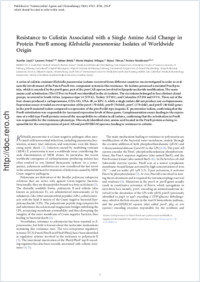Resistance to colistin associated with a single amino acid change in protein PmrB among Klebsiella pneumoniae isolates of worldwide Origin
- Jayol, Aurélie INSERM U914, South-Paris Medical School, K.-Bicêtre, France
- Poirel, Laurent INSERM U914, South-Paris Medical School, K.-Bicêtre, France - Medical and Molecular Microbiology Unit, Department of Medicine, Faculty of Science, University of Fribourg, Switzerland
- Brink, Adrian Department of Clinical Microbiology, Ampath National Laboratory Services, Milpark Hospital, Johannesburg, South Africa
- Villegas, Maria-Virginia International Center for Medical Research and Training, CIDEIM, Cali, Colombia
- Yilmaz, Mesut Medical Microbiology Department, School of Medicine, Istanbul Medipol University, Istanbul, Turkey
- Nordmann, Patrice INSERM U914, South-Paris Medical School, K.-Bicêtre, France - Medical and Molecular Microbiology Unit, Department of Medicine, Faculty of Science, University of Fribourg, Switzerland - Hôpital Fribourgeois–Hôpital Cantonal de Fribourg, Switzerland
-
30.05.2014
Published in:
- Antimicrobial Agents and Chemotherapy. - 2014, vol. 58, no. 8, p. 4762–4766
English
A series of colistin-resistant Klebsiella pneumoniae isolates recovered from different countries was investigated in order to evaluate the involvement of the PmrA/PmrB two-component system in this resistance. Six isolates possessed a mutated PmrB protein, which is encoded by the pmrB gene, part of the pmrCAB operon involved in lipopolysaccharide modification. The same amino acid substitution (Thr157Pro) in PmrB was identified in the six isolates. The six isolates belonged to four distinct clonal groups, recovered in South Africa (sequence type 14 [ST14]), Turkey (ST101), and Colombia (ST258 and ST15). Three out of the four clones produced a carbapenemase, OXA-181, OXA-48, or KPC-3, while a single isolate did not produce any carbapenemase. Expression assays revealed an overexpression of the pmrA (70-fold), pmrB (70-fold), pmrC (170-fold), and pmrK (40-fold) genes in the pmrB-mutated isolate compared to expression of the pmrB wild-type isogenic K. pneumoniae isolate, confirming that the PmrB substitution was responsible for increased expression levels of those genes. Complementation assays leading to the expression of a wild-type PmrB protein restored the susceptibility to colistin in all isolates, confirming that the substitution in PmrB was responsible for the resistance phenotype. This study identified a key amino acid located in the PmrB protein as being responsible for the overexpression of pmrCAB and pmrHFIJKLM operons, leading to resistance to colistin.
- Faculty
- Faculté des sciences et de médecine
- Department
- Médecine 3ème année
- Language
-
- English
- Classification
- Biological sciences
- License
-
License undefined
- Identifiers
-
- RERO DOC 213285
- DOI 10.1128/AAC.00084-14
- Persistent URL
- https://folia.unifr.ch/unifr/documents/303682
Statistics
Document views: 120
File downloads:
- pdf: 185
